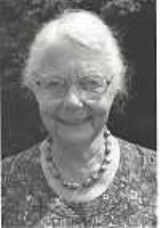
Eva Crane
Encyclopedia
Eva Crane was a researcher and author on the subjects of bees and beekeeping
. Trained as a quantum mathematician, she changed her field of interest to bees, and spent decades researching bees, traveling to more than 60 countries, often under primitive conditions. The New York Times reported that "Dr. Crane wrote some of the most important books on bees and apiculture" and noted "Her older sister, Elsie Widdowson
, who never retired either, helped revolutionize the field of nutrition, showing similar energy chasing seals on ice floes to study their eating habits."
Born as Ethel Eva Widdowson in London
she earned a Ph.D in 1941 in nuclear physics. She became a lecturer in Physics at Sheffield University. She married James Crane, a stockbroker serving in the Royal Navy Volunteer Reserve, in 1942. Her husband died in 1978.
Her interest in bees began when she and her husband received a beehive as a wedding present; the giver had hoped that it would help supplement their wartime sugar ration.
Crane wrote over 180 papers, articles, and books, many when she was in her 70s and 80s. Honey: A Comprehensive Survey (1975), in which she contributed several important chapters, and edited, came about because she told the publisher (Heinemann Press) that a book on the subject was sorely needed. Although now out of print, it remains the most significant review on the subject ever written. A Book of Honey (1980) and The Archaeology of Beekeeping (1983) reflected her strong interests in nutrition and the ancient past of beekeeping.
Her writing culminated in two mighty, encyclopaedic tomes, Bees and Beekeeping: science, practice and world resources (1990; at 614 pages) and The World History of Beekeeping and Honey Hunting (1999; 682 pages). These distilled a lifetime's knowledge and experience and are regarded as seminal textbooks throughout the beekeeping world.".
Beekeeping
Beekeeping is the maintenance of honey bee colonies, commonly in hives, by humans. A beekeeper keeps bees in order to collect honey and other products of the hive , to pollinate crops, or to produce bees for sale to other beekeepers...
. Trained as a quantum mathematician, she changed her field of interest to bees, and spent decades researching bees, traveling to more than 60 countries, often under primitive conditions. The New York Times reported that "Dr. Crane wrote some of the most important books on bees and apiculture" and noted "Her older sister, Elsie Widdowson
Elsie Widdowson
Dr Elsie Widdowson FRS , was a British scientist responsible for overseeing the government mandated addition of vitamins to food and war-time rationing in Britain during World War II....
, who never retired either, helped revolutionize the field of nutrition, showing similar energy chasing seals on ice floes to study their eating habits."
Born as Ethel Eva Widdowson in London
London
London is the capital city of :England and the :United Kingdom, the largest metropolitan area in the United Kingdom, and the largest urban zone in the European Union by most measures. Located on the River Thames, London has been a major settlement for two millennia, its history going back to its...
she earned a Ph.D in 1941 in nuclear physics. She became a lecturer in Physics at Sheffield University. She married James Crane, a stockbroker serving in the Royal Navy Volunteer Reserve, in 1942. Her husband died in 1978.
Her interest in bees began when she and her husband received a beehive as a wedding present; the giver had hoped that it would help supplement their wartime sugar ration.
Crane wrote over 180 papers, articles, and books, many when she was in her 70s and 80s. Honey: A Comprehensive Survey (1975), in which she contributed several important chapters, and edited, came about because she told the publisher (Heinemann Press) that a book on the subject was sorely needed. Although now out of print, it remains the most significant review on the subject ever written. A Book of Honey (1980) and The Archaeology of Beekeeping (1983) reflected her strong interests in nutrition and the ancient past of beekeeping.
Her writing culminated in two mighty, encyclopaedic tomes, Bees and Beekeeping: science, practice and world resources (1990; at 614 pages) and The World History of Beekeeping and Honey Hunting (1999; 682 pages). These distilled a lifetime's knowledge and experience and are regarded as seminal textbooks throughout the beekeeping world.".

